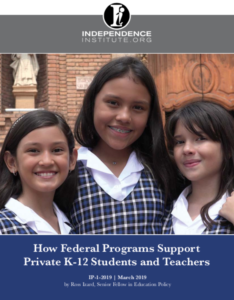How Federal Programs Support Private K-12 Students and Teachers

Federal law requires that private K-12 schools have access to federally funded “equitable services” through their local school districts. Our most recent paper outlines the various services and funding available to private schools and provides real Colorado examples of how private schools participate in federal programs.
Read More...
The Education Establishment is Dead, Long Live the Education Establishment?
“The king is dead, long live the king.” Have you heard that one before? It’s a phrase a variety of countries have used to simultaneously announce the death of a monarch and the ascension of a new one. The phrase has survived into the modern era in part because it provides an excuse to use the word epanalepsis and in part because it turns out to be a pretty poignant description of the lack of change when regimes shift. I was reminded of this old phrase while reading a recent blog post by American Enterprise Institute education guru Rick Hess, who has been working for a while now to prevent education reformers from morphing into a new education establishment. This particular post is in response to a number of folks who took issue with a previous Hess post criticizing the amount of bureaucratic paperwork involved in crafting state education plans under the Every Student Succeeds Act. You know, like the 150-page one Colorado submitted in May. In that post, Hess wrote: The vapidity of the exercise would be unremarkable if everyone clearly understood that these filings are the kind of pointless, paper exercise demanded by 21st century bureaucracy, and that the […]
Read More...
Reality Checked at the Door as Anti-DeVos Rhetoric Reaches a Fever Pitch
In case you weren’t paying attention, something really big happened in the education world two days ago. Betsy DeVos, President-elect Trump’s pick for secretary of education, had her confirmation hearing before the U.S. Senate Committee on Health, Education, Labor, and Pensions. The hearing was actually supposed to happen earlier this month, but it was delayed “to accommodate the Senate schedule.” In other words, politics happened. But Republican leadership stuck to its word about not allowing Democratic complaints over ethics paperwork to prevent the confirmation process from moving forward, and so DeVos’s hearing went ahead. You can watch the full hearing here if you are so inclined. I’m still waiting for a credible transcript to be released. In the meantime, I’d like to talk a little about the slanted coverage of the hearing I’ve seen. I don’t know if you’ve ever watched a confirmation hearing before, but I have. They tend to amount to a whole lot of rhetorical jousting by senators looking to score points against their rivals’ picks, various attempts to force nominees to make (often absurd) commitments, and a cat-like ability to avoid answering trap questions on the part of the nominees themselves. They usually get partisan—and ugly—fast. […]
Read More...
So… What Happens Now? Thoughts on What President Trump Means for Education
Something happened last night. I was already in bed, of course, but I could hear strange shouting downstairs. I couldn’t quite make it out, but it sounded like someone saying, “Wisconsin?! What?!” This morning I found my dad still awake, sitting in an arm chair with bleary eyes and a strange expression that I’m not sure I’ve seen on his face before. It was weird. It was really, really weird. I am, of course, referring to Donald Trump’s utterly astonishing victory over Hillary Clinton in last night’s presidential election. He deserves a hearty congratulation for defying the political odds and, in the end, pulling off exactly the kind of map-changing, crushing victory he said he’d accomplish. Truthfully, I never thought I would write the words “President-elect Trump.” But here we are.
Read More...
ESSA, Accountability, and High-Achieving Students
Happy Friday, fellow policy explorers. I usually try to let you off easy on Friday afternoons when it comes to policy discussions, but this week’s ridiculous distractions in Douglas County forced me to push back a post I’ve been meaning to do for a while about ESSA and how it relates to high-performing students. With the next ESSA Hub Committee meeting scheduled for this coming Monday, it seems appropriate to talk about that interesting issue sooner rather than later. Plus, there’s no such thing as a bad day for policy discussions! A big focus of the ESSA conversation has been on accountability systems. What will we measure? For whom? How? When? What about weights? In Colorado, we just had a major conversation about the notion of combined subgroups and what they might mean for accountability systems. All these discussions tend to revolve around how we best help lower-performing kids, schools, and districts. And don’t get me wrong, that’s an incredibly important question for those of us who view education as an opportunity to provide every kid with a chance at a fair fight and an opportunity to build his or her own success story. But what about the other side […]
Read More...
Ding Dong! NCLB Waivers Are Dead
I’ve talked a fair amount over the last couple of years about the “weaponized waivers” employed by the Obama administration under the federal Elementary and Secondary Education Act of 1965, the previous iteration of which was called No Child Left Behind. The newest iteration of the act, now called the Every Student Succeeds Act (ESSA), passed back in December of last year. As of yesterday, ESSA officially ushered NCLB waivers down the path of the dinosaurs. That’s great news for those of us who think that the federal government has little business dictating education policy to states.
Read More...


